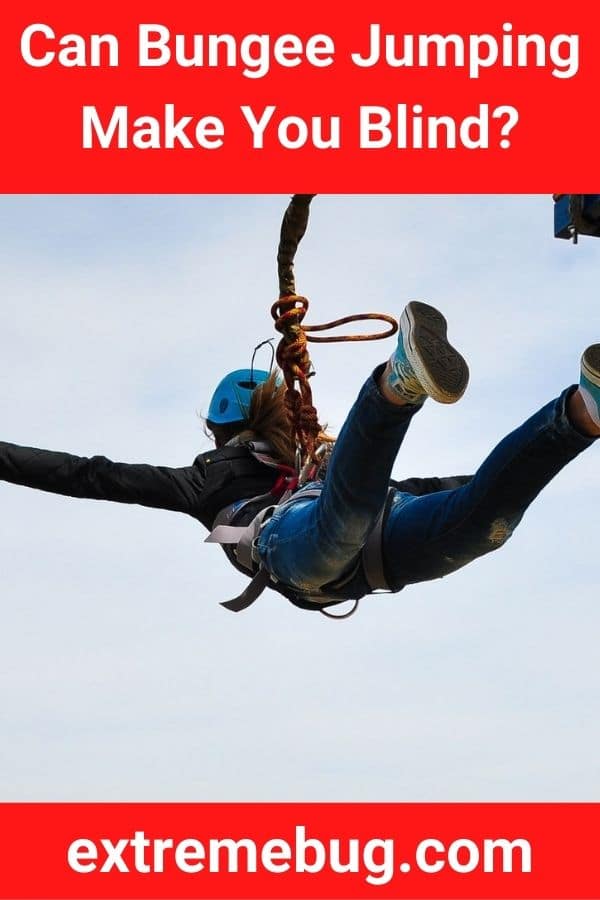A lot of things can race through your mind while you’re standing on the edge of a platform looking down at a large empty space and a bungee cord strapped to you.
With so much room between you and the ground, your deepest fears can start to creep into your head, especially once the staff member starts counting you down.
You might wonder why your heart is beating so fast.
You might be praying to yourself that the bungee cord doesn’t snap on the first bounce.
You could even be asking yourself if you’ll end up with a severe injury like a bad back, a sore neck, or if even the speed that comes with bungee jumping will make you go blind.
While it is possible to temporarily lose vision when bungee jumping, there’s a very low risk that you’ll go blind permanently. Bungee jumping can be a dangerous activity but provided that you’re using the proper equipment and you’re jumping with a trusted operator, then it can be as safe, and on some occasions, safer than many other extreme sports.
What Happens When You Bungee Jump?
Bungee jumping isn’t everyone’s cup of tea.
After all, it requires you to jump from a large structure such as a bridge, building, or cliff face while connected to a large elastic cord.
Once you’ve leaped, the cable that you’re bound to stretches like a rubber band.
When it reaches its full extension, it recoils, and you will rebound back towards the platform that you jumped from.
You’ll then continue to bounce up and down like a yoyo until you’ve come to a natural stop.
Depending on the cord that the provider uses, you can have two very different types of bungee jump experiences.
If the outer cover was applied when the latex strands were pre-stressed, then you’ll get a much more rigid, sharper snap on the first bounce after you jump.
But if the latex strands are exposed, then you’ll generally receive a softer bounce and experience a longer ride on the bungee cord.
Both types of cord are safe to use, and neither one is safer for your eyes or impacts your vision more when you’re bungee jumping.
Can Bungee Jumping Impact My Vision?
There have been reports of temporarily vision loss as a result of bungee jumping.
However, for the majority of people who have lost sight after jumping, their vision has returned within hours.
Vision loss can occur because the thin part of the retina is vulnerable to trauma.
The sudden rise in pressure on your face from free-falling can have impacts on the blood vessels in your eyeballs and cause temporary vision loss for a short period of time.
Medical practitioners have also reported that the intense emotional charge that comes from participating in an extreme activity, such as bungee jumping, can cause a temporary disturbance to your vision.
However, this is also a rare occurrence and can explain if you’re not able to see for several days after performing a jump.
Even though vision loss is listed as a risk when bungee jumping, it doesn’t happen often and is not something that every jumper experiences.
Can Bungee Jumping Cause Retinal Detachment?
While there are rare reports of bungee jumping causing retinal detachment, it’s not considered a common occurrence or a high risk to anyone looking to jump.
A retinal detachment is when the light-sensitive layer at the back of the eye gets pulled away.
It can result in a sudden loss of vision but can be restored with surgery.
It’s a severe injury and can lead to permanent blindness if it’s not treated urgently.
Retinal detachment is most often linked to genetics, diabetes, and an injury to the eye.
Symptoms can include an increase in witnessing floating shapes, momentary flashes of light, and a sudden onset of blurred vision in one eye.
It’s highly unlikely that bungee jumping can cause a retina to detach as there are few reports of this ever happening.
But if you have a high degree of short-sightedness, then it’s best to check with a medical professional that bungee jumping is safe for your situation before you go.
Will Bungee Jumping Cause Any Other Eye Injuries?
Some rare known eye injuries can occur from bungee jumping.
These can include bleeding in the eye, dislocated lenses, and tears in the eye that causes fluid to drain.
In extreme cases, when a tear occurs, it causes the fluid in the eye to not drain as well when there are tears around the drainage canal.
This can be one of the causes of glaucoma, which is when pressure builds around the eye due to it not being able to release fluid quickly.
While most people return to having perfect or near-perfect vision in the injured eye, the likelihood of being diagnosed with glaucoma has increased. It can result in a lifetime of medications and potentially surgery if it’s not treated correctly.
There have been a small number of cases where these injuries have resulted as a result of bungee jumping, but it’s not considered a common injury for the extreme sport.
Is Bungee Jumping Painful on the Eyes?
Bungee jumping isn’t known to cause any pain to your eyes when you’re jumping.
It’s often described as a free-falling feeling that only lasts seconds before you bounce back toward the platform.
As the bouncing gets slower and slower, the velocity to your face will continue to reduce until you come to a stop.
You’ll then be left dangling and eventually be lowered to the ground to be released from the bungee cord.
You won’t be provided with goggles to bungee jump, and you’re not able to wear glasses or any other eyewear.
But these won’t be required in order to complete a bungee jump.
Even though your body could reach a top speed of 124 miles per hour from jumping off of a platform, you won’t feel any pain to your eyes, and instead, you’ll receive a rush from the free-fall that only lasts a matter of seconds.
Should I Bungee Jump If I Have Vision Problems?
While there is a potential for eye injuries to occur when bungee jumping, it’s often best to check with a medical professional first if you already suffer from an eye condition.
If you are determined to leap, then it is possible to purchase some prescription safety goggles that can be used when bungee jumping.
Some bungee jump operators may even provide these on-site so that you’re able to enjoy the full experience that comes with the jump.
It’s also recommended to avoid wet bungee jumping if you suffer from an eye condition.
A wet bungee jump is when you’ll make an impact with the water before being snapped back towards the platform.
If you have concerns about what bungee jumping can do to your existing eye condition, then book an appointment with a medical professional first before you book in your first session.
Can Bungee Jumping Cause Issues For Other Parts Of Your Body?
Like any extreme activity, several risks come along with it.
However, most operators prioritize safety over everything else, which is why the odds of injuries occurring to your body parts, or worse, dying from a bungee jump is significantly low.
The National Center for Health Statistics in the United States shows the fatality rate among bungee jumpers is the same as dying from a bee sting.
The odds are an astounding 1 in 500,000.
Unless you suffer from a heart condition, epilepsy, high blood pressure, diabetes, a neurological disorder, or you’re expecting a child, then you shouldn’t try bungee jumping.
In fact, the operators won’t allow you to participate in the activity.
But if you do choose to take the leap, then you should be rest assured that the risk of you suffering a serious injury or worse is low provided that you’re using a recommended operator and the proper equipment.







